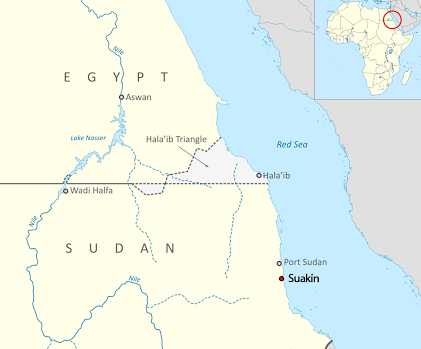(Mohamed Abdel Maguid – Egypt Today)
Egypt has watched very carefully Sudan’s decision to lease its Suakin Island in Red Sea to Turkey as Cairo experiences intense relations with Ankara and Khartoum over several political issues. The deal prompted media outlets in Egypt to question Turkey’s hidden aspirations in the region and the impact of such move on Egyptian interests.
During the Turkish President Recep Tayyip Erdogan’s first visit to Sudan on December 27, Sudanese President Omar Al-Bashir signed a decree on handing over Suakin to Turkey for a period of 99 years under the pretext of reconstruction. Erdogan said that Turkey will carry out large-scale restoration work and restore infrastructure on the island.
History and location
Suakin Island is located in north-eastern Sudan on the west coast of the Red Sea, an area of 20 km square, 66 meters above sea level, and about 560 km from Khartoum. For many centuries, Suakin used to be an important trading port in the Red Sea and one of the centers of Islamic civilization on the coast of East Africa. The island is of high importance to Sudan because it lies at the crossroads between Saudi Arabia and Port Sudan—Sudan’s current largest port, located just about 50 km north of the island.
Suakin used to be an important point in the journey of Muslim pilgrims traveling from African nations to Mecca and Medina to perform Hajj (pilgrimage), and for traders from East Asia to Africa and Europe.

During the Ottoman era, Turks constructed a mosque on the island for the Hanafi and Shafii Islamic schools of thought.
When the island is handed over to Turkey, the Turkish Cooperation and Coordination Agency (TIKA) and the Ministry of Culture and Tourism will restore the Ottoman relics there, including a 300-room caravanserai, or inn. TIKA has been operating on the island since 2011 and already has restored the Hanafi and Shafi mosques.
When the entire restoration project is completed, Turkish pilgrims traveling to Mecca will be able to fly to Sudan to visit historical sites and then go to Jeddah by ship, thus reviving the Ottoman ancient pilgrimage route.
Turkish growing interference
In addition to Turkey gaining temporary control of Suakin, Erdogan also signed 13 agreements covering different fields. Turkey vowed to build a new airport for Khartoum, a free-trade zone in Port Sudan, a port and shipyards for military and civilian ships in the Red Sea, grain silos at various locations, a university, a hospital and power stations. The countries are targeting an annual trade volume between them of $10 billion, up from the current $500 million.
What concerns Egyptians the most was the meeting held between Sudan and Turley’s chiefs of staff. It was reported that the two sides agreed to develop military cooperation.
Since Turkey declared 2005 “The Year of Africa,” it increased its number of embassies in the continent from 12 to 38. It has a sizable military presence in Somalia, where it just opened a base in September. The base, which cost about $50 million to build, now houses 200 Turkish troops and has a military academy that will train Somali officers.
After the Arab Anti-Terrorism Quartet (ATQ) – Egypt, Saudi Arabia, UAE and Bahrain – has cut diplomatic ties with Qatar for its support of terrorism groups, Turkey sent military troops to a base that can accommodate 5,000 soldiers near Qatar’s capital of Doha in June 2017. Troop strength is expected to reach at least 3,000. Ankara’s support to the Qatari regime caused a tension with Riyadh.
Bashir promised to allocate a shipyard to Turkey, which Sudan will take back when Ankara is done with the rebuilding. There were no details given yet on securing workers, buildings and construction sites in the region, which suffers from attacks.
Turkey claimed that its presence in the Suakin Island would secure access to western Saudi Arabia from invaders coming from the Red Sea.
Turkey also has strong ties with Somalia, another East African country. Turkish soldiers are training the Somali army at a military camp built by Turkey in the capital Mogadishu.
********






